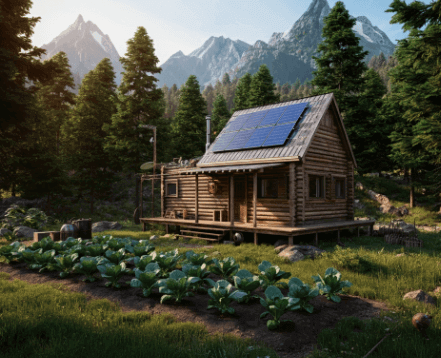Looking to escape the grid and find your dream slice of off-grid paradise? Over one million Americans are opting for off-grid living, drawn by the promise of independence, sustainability, and simplicity. However, finding the right land to make that vision a reality can feel overwhelming. That’s why this guide to find off-grid land for sale is here to help you make informed decisions. Renowned real estate investors Steve Daria and Joleigh, known for purchasing land for cash, have transformed the process into a seamless experience for buyers. They not only simplify the land-buying process but also offer valuable insights into what to look for in off-grid properties. Whether you’re after breathtaking views or fertile land for living off the land, learning how to find off-grid land for sale involves strategy and key considerations, such as location, zoning regulations, and accessibility. Why not take the first step toward your dream? Book a free discussion with Steve and Joleigh today to gain expert guidance and start your off-grid adventure!
Why is living off-grid becoming popular?
Living off-grid has become increasingly popular as more people seek a lifestyle that is both sustainable and independent.
The drive to reduce reliance on public utilities such as electricity, water, and gas motivates many to explore living off the land.
By going off-grid, individuals can reduce their monthly expenses, minimize their environmental footprint, and experience a greater sense of freedom.

Modern technology has made this way of life much more accessible than before, with solar panels, wind turbines, and rainwater collection systems all helping people become more self-sufficient.
Many are also drawn to the peace, quiet, and simplicity that come with living far from busy cities.
Off-grid living often means growing your own food, using renewable energy, and building a life closer to nature.
This minimalist lifestyle is especially appealing to those who want to slow down, savor the moment, and prioritize their well-being.
If you want to begin this journey, you’ll need to find off-grid land for sale that matches your needs carefully.
Consider important factors such as location, climate, water sources, and local regulations to ensure you find the right property for your off-grid dreams.
Get Started: Get Your Cash Offer Below…
We are direct land buyers. There are no commissions or fees and no obligation whatsoever. Start below by sharing where your property is and where we can send your offer…
Where can I find off-grid land for sale?
Finding off-grid land for sale can feel overwhelming at first, especially if you don’t know where to start.
The good news is that there are plenty of helpful resources available to guide you in your search.
Dedicated websites specializing in off-grid properties make it easier to compare listings and features, such as natural water sources, solar exposure, and access to local amenities.
In addition to online platforms, working with real estate agents who specialize in rural or remote areas can provide valuable local insights and access to properties that meet your needs.
Attending land auctions—both online and in-person—is another great way to find unique parcels of land, sometimes at better prices than traditional listings.
Don’t overlook the power of word-of-mouth, either: networking with other landowners or members of off-grid communities can open up opportunities for private deals that may not be publicly advertised.
Joining online forums and social media groups about off-grid living is an effective way to discover new listings.
By putting in the time to research zoning regulations, water rights, and energy options, you’ll be well prepared to find off-grid land for sale that matches your vision for independent living.
What should I look for when researching off-grid land?
- Access to Water Sources: Check if the property has a year-round, reliable water source such as a well, natural spring, stream, or pond. Stable and abundant water access is crucial for daily living, growing food, and emergency use when you choose to find off-grid land for sale.
- Zoning and Legal Restrictions: Investigate local zoning laws, land-use regulations, and building codes to confirm that you can live, build, and utilize the property as intended. These rules impact your ability to generate power, raise livestock, or install certain systems, so understanding them is essential for comfortable off-grid living.
- Energy Potential: Evaluate whether the land receives sufficient sunlight for solar panels, has open areas suitable for wind turbines, or has the potential to harness hydropower. This is a vital step when you’re trying to find off-grid land for sale that will fully support your desire for sustainable, independent energy solutions.
- Access and Accessibility: Consider the type of roads leading to the property, and how easy or difficult they are to navigate in all seasons, especially during rain or snow. Remote properties may require off-road vehicles, maintenance equipment, or investments to ensure safe and reliable access at all times.
- Land Quality and Usability: Inspect the soil quality, natural vegetation, and overall terrain to determine if the land is good for farming, gardening, or other intended activities. Ensure the property meets your specific needs, such as space for crops, animals, or recreational areas, so your off-grid lifestyle can truly thrive.
Are there financing options for purchasing off-grid land?
Several financing options are available for purchasing off-grid land, and they may differ from traditional home loans.
Many buyers start by exploring land loans, which are specifically designed for purchasing vacant or undeveloped property.
These loans usually require a bigger down payment and sometimes have higher interest rates compared to standard mortgages.
If you plan to build a house or other structures on your land, a construction loan can help cover both the purchase and building costs.
For those seeking extra flexibility, personal loans work for smaller plots, especially if you don’t meet the requirements for more traditional lending.
Another path to consider is owner financing, where the seller allows you to pay for the land over time through direct payments, rather than going through a bank.
This option may be easier to qualify for and can provide more flexible terms.
Before making a decision, it’s wise to review all your financial options and compare rates, requirements, and terms.
With good research and planning, you’ll be ready to find off-grid land for sale and make your dream of off-grid living a reality.
How can I evaluate if off-grid land is fairly priced?
- Research Comparable Properties: Identify similar properties for sale in the same region and note their asking prices, sizes, and features. By examining these factors, you can assess if the land you’re interested in is fairly priced according to local market trends.
- Assess the Land’s Features: Look closely for features that add real value, such as access to fresh water, fertile soil, mature trees, or renewable energy potential. Properties that have more of these helpful characteristics often justify higher prices, so consider which features matter most to you.
- Understand Zoning and Restrictions: Before purchasing a property, verify its zoning rules, building codes, and any applicable local restrictions. Fewer limitations make it easier to build your off-grid dream and can mean the land is worth more compared to other lots with more red tape.
- Evaluate Development Costs: Consider the expenses associated with making the land habitable, including building shelters, installing septic systems, and adding solar panels. Big expenses can make even inexpensive land more expensive in the end, so consider these when making your overall decision.
- Seek Professional Advice: It’s wise to hire a qualified land appraiser or a real estate agent who specializes in rural and off-grid properties. With their expertise, you can be sure you’re making a wise choice and get the most value as you look to find off-grid land for sale that matches your goals.

What are the steps to finalize the purchase of off-grid land?
Finalizing the purchase of off-grid land involves several important steps to ensure everything is in order.
Begin by verifying that the land meets your needs, considering factors such as water access, zoning laws, and energy potential.
Perform a title search to verify the seller’s ownership and confirm that there are no liens or disputes associated with the property.
Next, negotiate the terms of the sale, including the price, payment method, and any contingencies, such as environmental inspections.
Obtain the necessary financing, whether through a land loan, personal loan, or seller financing options.
Engage a qualified real estate attorney who can expertly review your contract and ensure it supports your off-grid living goals.
Once the paperwork is complete, arrange for the transfer of ownership through your local county recorder’s office to finalize everything.
Finally, take the necessary steps to prepare the land for use based on your goals.
Start your journey today and find off-grid land for sale that fits your vision for independent living!
Takeaway
- Define Your Requirements: Identify your goals for living off-grid, such as access to water, energy sources, and adherence to local zoning laws. Understanding your requirements can help you find the best locations that align with your lifestyle.
- Use Specialized Resources: Explore websites, forums, and real estate agents focused on remote properties. These platforms often feature listings specifically for those seeking off-grid living options.
- Research Legal and Zoning Restrictions: Verify the land’s zoning and building regulations to ensure your plans are feasible and compliant with local laws and regulations. Restrictions can affect your ability to build, farm, or live on the land the way you envision.
- Evaluate Land Features: Check for key attributes, such as soil quality, water sources, and accessibility. These factors influence the land’s value and suitability for your desired off-grid setup.
- Plan for Financing and Development Costs: Budget for land loans, owner financing, or development expenses. Being financially prepared ensures a smoother purchase process and an easier transition to off-grid living.
**NOTICE: Please note that the content presented in this post is intended solely for informational and educational purposes. It should not be construed as legal or financial advice or relied upon as a replacement for consultation with a qualified attorney or CPA. For specific guidance on legal or financial matters, readers are encouraged to seek professional assistance from an attorney, CPA, or other appropriate professional regarding the subject matter.
